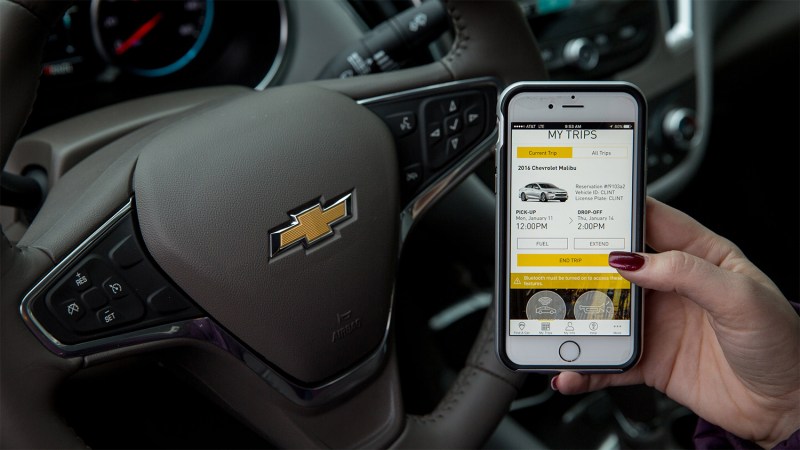
One day in the near-future, the idea of owning just about anything will seem passé — like Myspace and the Microsoft Zune. Why buy a car, a house, a lawnmower, or a dog when you can pay to use someone else’s? The explosion of the car-sharing economy, in particular, is due in large part to Uber, Lyft, and Zipcar. Now GM is planning to double down on the brand’s Maven wheels-on-demand app by allowing peer-to-peer rentals.
Maven’s current incarnation relies on simplicity — just download and launch the free app, which functions much like Zipcar’s ride-sharing plateform. Create a free account, enter your credit card details, and you’re ready to drive. From there, it’s a matter of selecting the model of car you’d like and for how long. Naturally, the inventory of cars is exclusively GM-branded. There are eco-class cars (like the Chevy Volt), compacts (Chevy’s Spark or Cruze), sedans (including the Buick Regal or Cadillac ATS), and even SUVs (like the GMC Yukon or Cadillac Escalade). Pricing for SUVs starts at USD $14 per hour, while every other class starts at just USD $8 hourly.

Since launching in Ann Arbor, Michigan, in January 2016, Maven has expanded to dozens of North American cities. However, the service has always functioned much like Zipcar. Basically, GM-owned cars are made available at downtown lots throughout a city, where users can rent by the hour for as long as they like.
The expansion of the Maven app to include GM car owners is what sets this news apart. The service will evolve to include peer-to-peer rentals so owners can rent their cars directly to drivers. It’s like Airbnb for your GM car. GM owners need only opt into the program with a few simple steps to start sharing their wheels.

Since the implosion of the U.S. car market a few years ago, GM announced it was slowly shifting to become a “mobility” company rather than an automaker. Outside glossy automotive industry magazines, GM’s inner business workings aren’t exactly gripping news, but the fact that the former world-leading automaker is shifting gears away from, you know, making automobiles is a clear sign the car-sharing economy is here to stay. In light of self-driving cars on the horizon, we’ll live to see the day when car renters vastly outnumber car buyers. On a global scale, where we’re rapidly overpopulating the planet, it’s the next logical step economically and environmentally.
The peer-to-peer-enabled version of the Maven car-sharing program is likely to launch nationwide by mid-2018, though GM has yet to confirm an exact date.


